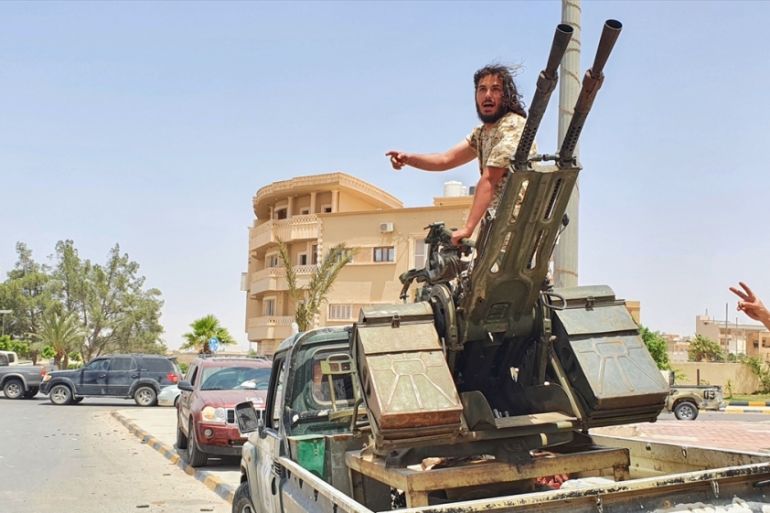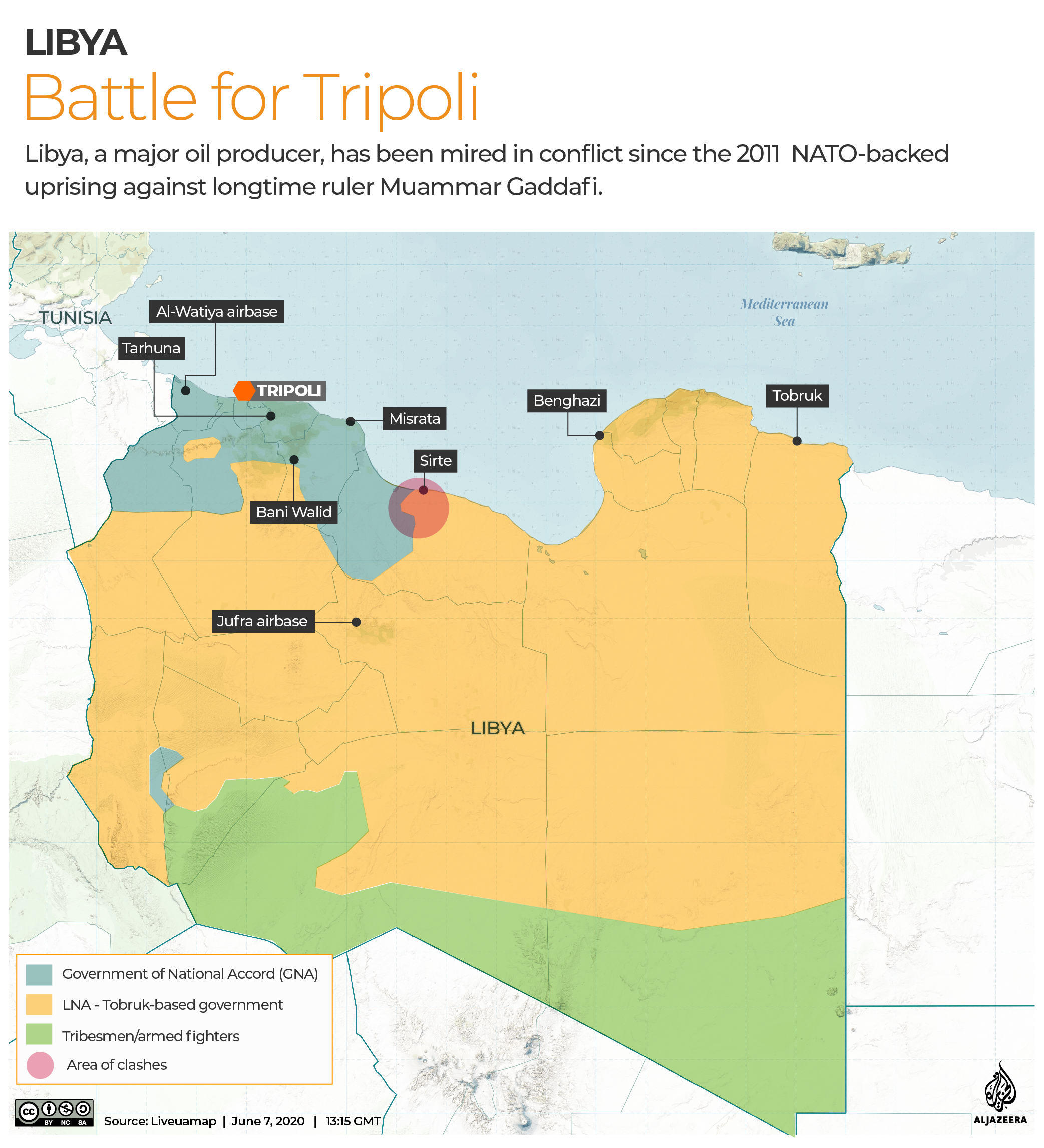Libya: Haftar’s forces ‘slow down’ GNA advance on Sirte
Tripoli government forces say they are close to entering Sirte but LNA vows to keep fighting until ceasefire accepted.

Eastern-based forces allied with Libyan renegade military commander Khalifa Haftar have slowed down an advance by the country’s internationally recognised government into the strategic city of Sirte, military officials told Al Jazeera.
The Government of National Accord’s (GNA) campaign into central Libya follows the recent capture of the last major stronghold of Haftar’s Libyan National Army (LNA) in Tarhuna, where multiple mass grave sites were found southeast of the capital, Tripoli, on Wednesday.
Keep reading
list of 3 itemsUN says Libya’s warring parties engaged in ‘productive’ talks
Battle for Tripoli
Bolstered by recent battlefield gains and a withdrawal by the LNA from around Tripoli, the GNA’s military launched the operation dubbed Paths to Victory to take Sirte and al-Jufra on Saturday.
“We will enter Sirte. This isn’t a battle for cities like Tripoli or Sirte. It is a fight for Libya, for freedom and democracy,” Abdelmenaam al-Draa, a military spokesman, told Al Jazeera. “We will continue east until we liberate all of Libya from the war criminal Haftar.”
|
|
Supported by Turkey, the GNA’s forces gained the upper hand last week after retaking Tripoli airport, all main entrance and exit points to the city, and a string of key towns, forcing Haftar’s fighters to withdraw – defeats their command painted as a tactical measure to give the UN-backed peace process a chance.
GNA military sources, speaking anonymously due to the confidentiality of the information, told Al Jazeera they received air defence systems from Turkey and were working on building up air capabilities in central Libya.
Al Jazeera’s Malik Traina, reporting from Abu Grein outside Sirte, said for the moment the LNA, which is backed by the United Arab Emirates, Russia, and Egypt, enjoys air superiority but that is expected to change soon.
“It appears the LNA have been able to slow the GNA’s advance into Sirte because, at the moment, they enjoy the upper hand in air power in central Libya,” he quoted military sources on the ground as saying.
Multiple mass graves
Meanwhile, multiple mass graves have been discovered in Tarhuna and other areas recently retaken from Haftar’s forces.
The Libyan National Commission for the Identification of Missing Persons announced the discovery of 15 bodies out of a hundred reported in Tarhuna, 65km (40 miles) south of Tripoli.
The GNA said the graves contain the remains of imprisoned government soldiers.
The exact number of bodies has not been made public but officials said the bodies are badly decomposed and cannot be identified.
“So far, two bodies have been exhumed. The region is full of corpses,” Lutfi Tevfik Misrati, head of an office investigating disappeared people in the country, told Anadolu news agency.
“We think that there are 10 to 12 bodies in another grave in the field. Graves were found at five or more different points,” Misrati said.
‘Liberate Libya’
Libya, a major oil producer, has been mired in turmoil since 2011 when longtime ruler Muammar Gaddafi was toppled in a NATO-backed uprising.
On Wednesday, the United Nations said the two warring sides were “fully” engaged in military talks aimed at ending the fighting in the country, calling the separate virtual meetings “productive”.
The latest round of talks came after the collapse of a 14-month offensive by the LNA to capture Tripoli and its retreat from most of its territory in northwest Libya following a series of military setbacks.

A unilateral ceasefire offer over the weekend by Egyptian President Abdel-Fattah el-Sisi was rejected by the GNA and Turkey.
“The call for ceasefire or the joint declaration, to us, is stillborn. It’s not realistic, it’s not sincere,” Turkish Foreign Minister Mevlut Cavusoglu told NTV on Thursday.
He criticised the countries backing Haftar and said that without their support, the strongman was “zero”, adding that Turkey would support “a binding ceasefire under the auspices of the UN”.
‘Where were they?’
Ahmed al-Mesmari, a spokesman for Haftar’s forces, said they would continue operations until the ceasefire offer was accepted by the GNA.
“Although the international community is increasing their pressure on the GNA to begin peace talks, fighters on the ground, military and political officials say they will carry on their advances,” Al Jazeera’s Traina said.
“They feel let down by the international community for allowing Haftar to continue his campaign for over a year.”
Abdelhamid Abuzayan, a field commander for the GNA forces, told Al Jazeera: “Where were they when Haftar was shelling our families in Tripoli? When our men were dying defending their land?
“Haftar came from 1,000km away, they could have stopped him. Now when we start to have the upper hand they want peace? No, we will continue until we liberate all of Libya from the war criminal, Haftar.”